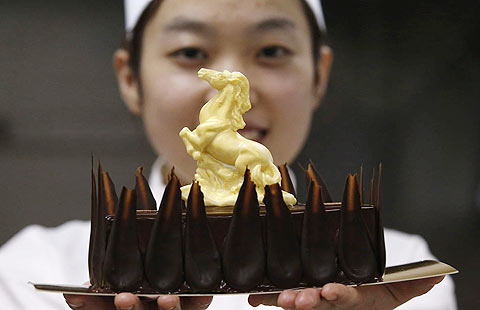China backs Japan's aggression history study
Updated: 2014-01-29 21:18
(Xinhua)
|
|||||||||||
BEIJING - China supports the Republic of Korea (ROK)'s decision to push for a joint international study on Japan's aggression history, Chinese Foreign Ministry spokeswoman Hua Chunying said on Wednesday.
The ROK plan is for a joint study with China and Southeast Asian nations on Japan's invasion during World War II (WWII). The proposal is in response to frequent provocations from Japan.
"We are willing to keep in touch with all victim countries in Asia, to safeguard historical justice and the conscience of mankind, as well as protect the post-war international order," Hua told a daily news briefing.
China and the ROK advocate that Japan has to face up to and reflect on its history, admit and correct its mistakes to gain trust from neighbors and the international community, Hua said.
China-Japan ties have suffered a string of setbacks since last month, following Japanese Prime Minister Shinzo Abe's visit to the Yasukuni Shrine, where Japanese WWII criminals are honored.
The new chief of Japanese public broadcaster NHK on Monday retracted a comment about "comfort women" he had made. Katsuto Momii had said the system of "comfort women" could be found in any country and was a reality at wartime.
Japan is also attempting to revise its textbooks on the Diaoyu Islands.
"China and the ROK strongly oppose Japan's wrong moves," Hua said.
According to Japanese media reports, Abe on Wednesday called for summit meetings with Chinese and South Korean leaders to address the problems that have increased tension in Asia, while also reiterating his intention to revise Japan's pacifist Constitution.
Abe also said leaders of Japan, China and South Korea "should meet and frankly discuss (issues) without setting any preconditions."
"Japan is shouting empty slogans for dialogue while refusing to recognize its mistakes and blemishing China," Hua said.
Japan's development path not only concerns its own future, but also peace, stability and development in Asia, Hua said, urging Japan to reflect on history and take a peaceful development path.
Related Stories
Japan should learn from Germany: US expert 2014-01-29 08:08
China urges Japan to admit mistake in history 2014-01-28 20:22
ROK protests Japan's textbook revision 2014-01-28 20:22
Japan revises teaching manuals 2014-01-28 20:20
China urges Japan to admit mistakes 2014-01-28 20:11
Today's Top News
Experts call for detailed H7N9 rules
Huawei pledges more jobs in Europe
HK confirms H7N9 case, to cull 20,000 poultry
Chinese President to visit Paris to boost ties
China and EU to boost political trust
US urges Japan to apologize
Int'l hacker got caught in China
More than 300 fall ill on Royal Caribbean ship
Hot Topics
Lunar probe , China growth forecasts, Emission rules get tougher, China seen through 'colored lens', International board,
Editor's Picks

|

|

|

|

|

|





